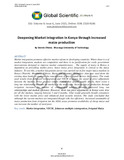Deepening Market Integration In Kenya through Increased maize production
Abstract
Market integration promotes effective market reform in developing countries. Where there is a of market integration, markets are competitive and there is no justification for costly government interventions designed to improve market competitiveness. . The supply of maize in Kenya is dependent on prevailing market price; hence maize price integration is critical to the maize industry. To test this, a market integration survey was carried out in five major maize markets in Kenya (Nairobi, Mombasa, Eldoret, Busia and Kisumu). Secondary data was used from the existing data banks to evaluate the transmission of price signals across the country. The study used results from Johansen cointegration and VECM to assess the speed of price adjustment between the markets. Price analysis results showed that despite supply shocks, there exists a long run relationship between the markets in the study area. Increased local production through irrigation increases the number of cointegrated markets through improved long run relationships and market efficiency. However, short run price adjustments in Kenya were slow for all the markets, ranging between 3 and 4 months.. Glut would generally benefit consumers with the lower market price and enhanced food security mission. The study concluded that although the current markets are integrated though with low efficiency. Increased sustainable of maize production from irrigation inn the ASAL areas promotes availability of cheap maize and can increase the number of rural poor.
Collections
- Journal Articles (BE) [333]

